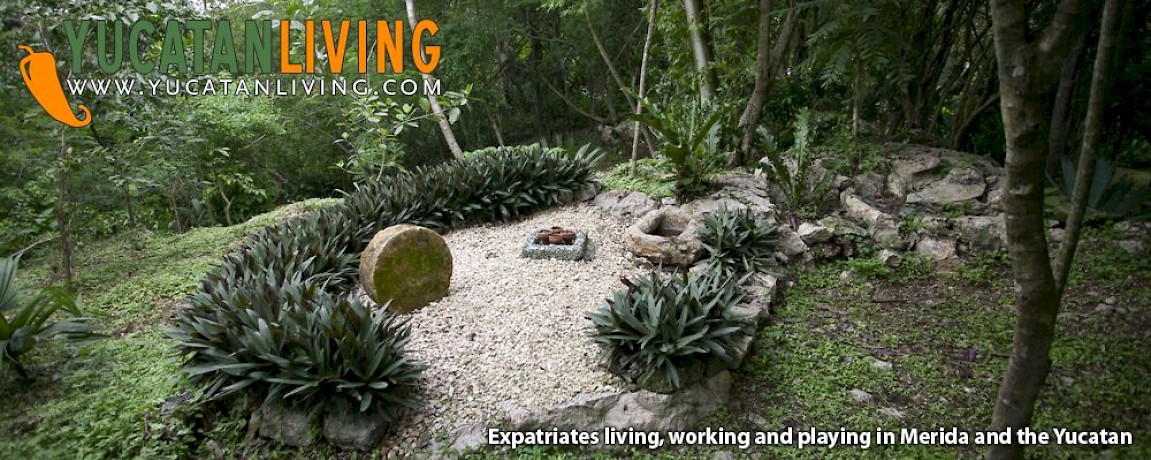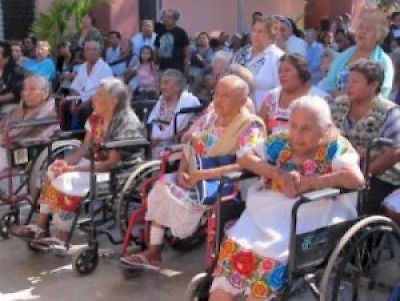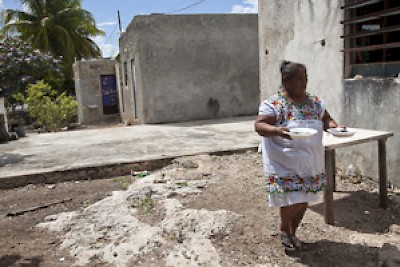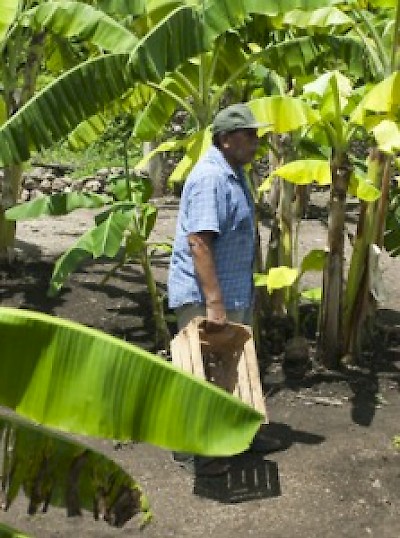Yucatan News: Organics & Ecotourism
The Season of Benefit Events
One of the most common questions received by Yucatan Living is “What can I do to help?” January brings the miracle of spay/neuter programs for dogs and cats, but what about the people of the Yucatan? Those who come to Yucatan to stay for a while, or forever, soon find that there are many social programs that are always in need of help and depend on one or two annual fundraisers to keep them going. The time between Carnival and Semana Santa (the Two weeks surrounding Easter) sees more than a few benefits for both the elderly who reside in local shelters (nursing homes) and the poor among the elderly population who still reside in their own homes. Catholic women’s organizations, church-by-church and all across Mexico, as well as many civil organizations, are dedicated to seeing to it that this kind of help is sustained. They also make sure that these events are a positive experience for everyone who participates. Such will certainly be the case in Hunucma, where the local Catholic congregation will hold a dance on February 28 and a bull fight on March 2. The proceeds of these events will go to support a shelter for the elderly where only five residents live, but support will also be in place for many of the elderly poor in the area. If you would like to help in Yucatan, do look for the kinds of experiences where you can attend an event, become part of the community that supports the program, and know that all of your donation will go where you intended it to go.
Health: Climate Change and Respiratory Illness
Those of us who have warm coats, solid walls and comforters on our beds tend to grumble about a few days of cool weather and go on about our business when the sun returns. Unfortunately, people who live in tropical countries often do not even own luxuries like fleece pajamas, fat socks and fuzzy slippers... even sweaters and coats. This year, among Yucatecos, the incidence of respiratory illness is running a little greater than 13% over the same time period last year. The numbers are telling us that new respiratory illness numbers, on average, are running at a little more than 14,000 per week, except for week number five of 2014. That week saw 15,477 new cases of respiratory illnesses reported in Yucatan. Older expats remember when nortes were few and far between. Virtually everyone walked around with a plastic bag of peeled fruit in their hand and bragged that almost no one ever got sick in Yucatan. Over the past 15 years, climate change has brought the common cold and the flu to Yucatan. It’s time to eat well, including foods high in vitamins A and C, get plenty of rest and dress warmly in thick cotton clothing. Healthcare professionals also recommend sneezing into a tissue or into the bend of one’s arm to help stop the spread of germs. As always, frequent hand-washing is a must!
Yucatan: Of Microbes and Green Homes
This photo is of a typical house in rural Yucatan... well, maybe a lucky family who had money to build a cement house to weather a hurricane and a cement floor to stay out of the mud. They even have a small concrete block outhouse, courtesy of the Yucatan government after Hurricane Isidore. As modern services spread to every corner of the state, their cost is rapidly becoming a burden for the people. It does not help that the government builds low cost housing if utility bills make it impossible for the poor to live in a modern home. While the world worries about running out of fossil fuels, Yucatan’s researchers at the Specialists Scientific Research Center of Yucatan (CICY) got busy finding a way to run a rural Yucatan home without the use of fossil fuels. This past week, these researchers presented a model of a sustainable green home that uses solar panels on roofs and microbes painted onto septic tanks to generate the electricity necessary to completely cover the electrical needs of the home. This, added to the use of recycled materials to insulate the home and create insulated interior walls, and windows that are also waterproof. From roof to foundation, these new homes will be moisture proof and their hybrid electrical system will even allow for the removal and treatment of the home’s wastewater. Many thanks to CICY, to UADY and other participating universities, to the social and governmental associations that support this project, and to the members of the private sector who will make all of this a reality.
XVI Anniversary of Sustainable Use of Wildlife in Yucatan
Sixteen years ago, Yucatan, under the strict supervision of SEMARNAT, embarked on a plan to conserve wildlife in a way that would allow both the raising and harvesting of wild fauna and flora. Since then, 298 grounds have been created to manage wildlife in confined areas, plus 76 farms that raise and protect both common and rare species of plants that are native to Yucatan. The white-tailed deer is, by far, the most popular beneficiary of this program. This photo was taken of a white deer on a small preserve in Muna, Yucatan. In addition to the deer, visitors can find everything here now from rare parrots and monkeys to orchids. This, of course, brings up the topic of a renewed interest in ecotourism. Those sixteen years were going to pass whether Yucatan did anything to create these areas of conservation or not. Now the program has been assessed and found to be wildly successful. Everyone is very proud of those who were and still are interested in creating a true paradise in Yucatan.
SEMARNAT Supports Ecotourism Certification
With no access to jobs and little access to resources, many of the rural poor were floundering in Yucatan. Then, SEMARNAT recognized the national and international trend toward ecotourism and things began to change for the better. Rural residents across the State of Yucatan are now in the process of meeting the requirements for certification as ecotourism destinations. Environmental tourists need a place to stay and access to areas of interest without disturbing the environment. Even local residents are getting interested in the flora, fauna and geography of their native lands, and traveling to explore them. (See our recent article about Bird Photography in the Yucatan). Tourist operators need access to credit to support their projects and proof that they are capable of earning money through their efforts. SEMARNAT has a list of all the criteria necessary to meet these requirements and the people are rapidly meeting them all. From the beach to the southern cone, rural Yucatecos have formed associations and built facilities that meet all of the requirements given to them. Their determination has brought them success and has drawn investments to their projects. It won’t be long now until the very people who lived so deep in poverty will be sitting in the cat-bird-seat, living the good life in the paradise they love.
Up From Poverty – the Organic Way
Of the 106 municipalities (counties) in the State of Yucatan, 12 have been found to suffer from food poverty, mostly stemming from a scarcity of jobs in the rural areas in which they live. When the numbers came in, the State of Yucatan had just begun a Temporary Employment Program and SEMARNAT was able to contribute 18.8 million pesos to the program. The twelve municipalities in need soon had brand new tools and are now in the organic farming business. The program is called the Organic Gardens Project. Since Mexico encourages small businesses and self-employment, these new farmers are also being given classes in the management of water, waste and wild life. Soon, these organic farmers will be independent agri-business owners. Considering that their crops will be organically grown, all of Yucatan will be the better for their work and food poverty in their municipalities will be little more than a bad memory.
Telecommunications and IT Jobs Six Percent of Yucatan’s GDP
In 2002, there were 20 telecommunications and information technology companies in Yucatan and they provided 300 jobs. Today, there are more than 120 of these companies in Yucatan and they employ over 2,000 people. This past week, at a convention at Siglo XXI, 14 companies offered 200 new jobs with salaries ranging from 6,000 pesos to 35,000 pesos per month. The average salary was 14,000 pesos. Because Yucatan has an educated work force, the telecommunications and IT companies continue to come to Yucatan. Currently, negotiations are ongoing with a company from Texas. The jobs in this field are stable and provide a good living for the families who benefit from them. This is not lost on Yucatan’s young people as they flock to the computer science programs in Yucatan’s universities. Look for telecommunications and information technology to be a growing segment of Yucatan’s GDP for many years to come.
Yucatecos Recognizing Rampant Consumerism
The Department of Economic Development estimates that half of all wage earners in Yucatan have faced problems, at one time or another, due to either exceeding their credit limit or for making late payments. There was a time when Mexico had a cash economy. People saved until they could pay for what they wanted. We cannot make the claim that those were the good old days, but at least people were not buying things they did not need or could not afford. As Yucatecos raced into spending beyond their ability to pay, especially on innovative products and services, the problem was recognized. There were, of course, many symptoms, including family problems and even health problems, all of which often stemmed from financial difficulties. PROFECO already has a magazine for consumers, and other agencies are developing programs that will better educate the public on how to both budget their money and use credit wisely. All of these programs stress the need to increase savings and reduce levels of debt. This is one of the hardest lessons for modern consumers to learn, and Yucatecans are no different. Since consumerism has the potential to damage families, as well as local, state and federal economies, we hope that Yucatecos play the credit game smarter than consumers in many other countries.
Full Moon Jazz Raffle: Winning Tickets
If you are the holder of a raffle ticket from the Full Moon Jazz Festival, please check your ticket to see if it is a winner. The 50/50 raffle is a pink theater-like ticket. The other raffle tickets are the tickets that are on the bottom of your entrance ticket, or the ticket itself has numbers. The following tickets are winners:
50/50 Pink Ticket: #76160
Tai Spa Manicure and Pedicure: #339, 289, 333, 353, 104
Eduardo Romero Free Haircut: #147, 338
Happier at Home book, signed by author: #517
Restaurant Le Bistrot, dinner for two: #354, 357
Amici's Specialty Pizza with side salad, two sodas: #326
Watercolours: 344 (claimed)
Bull Pen: 327 (claimed)
The proceeds from this annual event go to support the Telchac Education Foundation.












Comments
Working Gringos 12 years ago
Daniel, here is the article from which we got the information. It is more specific and lists a couple of names and their departments.
http://sipse.com/milenio/microbios-vivienda-ecologica-merida-sustentable-energia-76756.html
Reply
Mary Lou Martin 12 years ago
A lot of good news in this post. Thank you.
Reply
Daniel Oseguera 12 years ago
Who can I talk to at Cicy or UADY to find out more on your featured sibject
"Yucatan: Of Microbes and Green Homes" ??
Thanks
Reply
(0 to 3 comments)